Vampire Weekend’s Ezra Koenig: ‘My passion in life is chilling’
In the five years since the release of ‘Father of the Bride’, Ezra Koenig has lived across the world with his family, shed a cynicism that had followed him around since his teens, and made new album ‘Only God Was Above Us’, the band’s most interconnected statement yet — all while discovering a new laidback philosophy
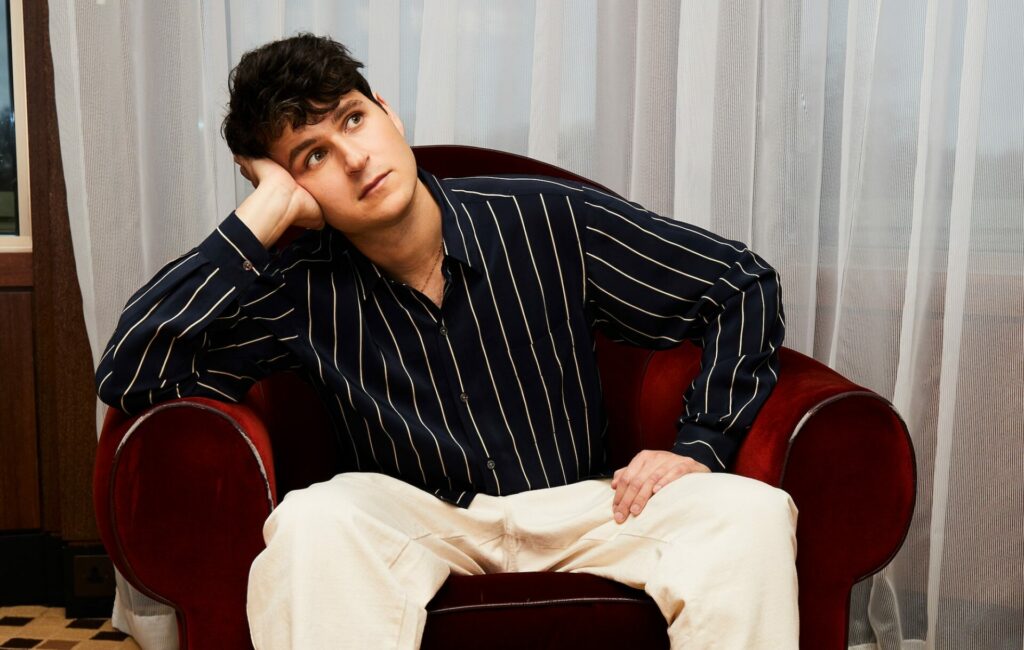
Beginning an album with the lyric “fuck the world” is a bold and pointed choice, but Ezra Koenig has a few qualifiers to share.
“There’s something provocative about opening with that line, but it was important to me that it was in quotation marks,” he tells me from the sofa of a plush London hotel, where he’s just wrapped his Rolling Stone UK photoshoot. “It says, ‘Fuck the world / You said it quiet’. We’re not out here on some Mötley Crüe bad boy shit. ‘Middle fingers up, Vampire Weekend’s back!’”
Rather than a balls-out statement of intent, the lyric that opens ‘Ice Cream Piano’, the first track from the band’s fifth album Only God Was Above Us, is a softly sung and solemn admission of cynicism. “It’s about somebody who’s either talking to someone or arguing with themselves,” Koenig says of the song. “They’re talking about a fatalism and a cynicism. It’s a type of anger at life and at the world — fuck the world. There’s definitely ambivalence and anxiety in that song, and there is a lot of that in the early songs on the record.”
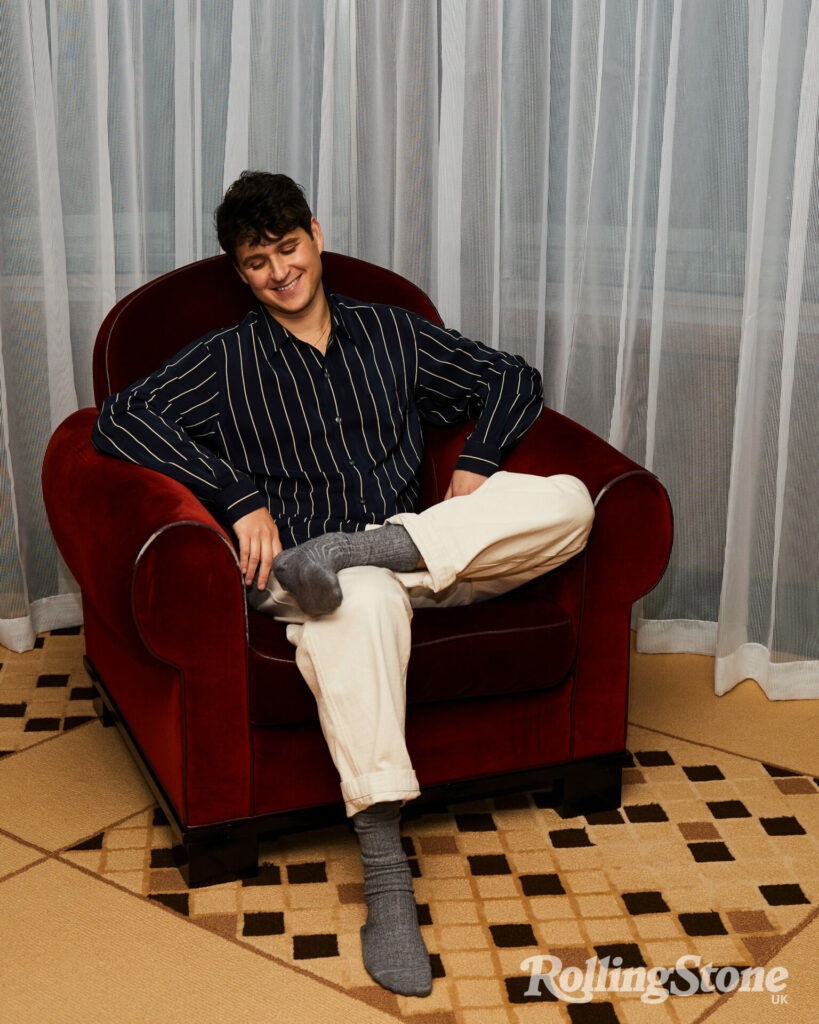
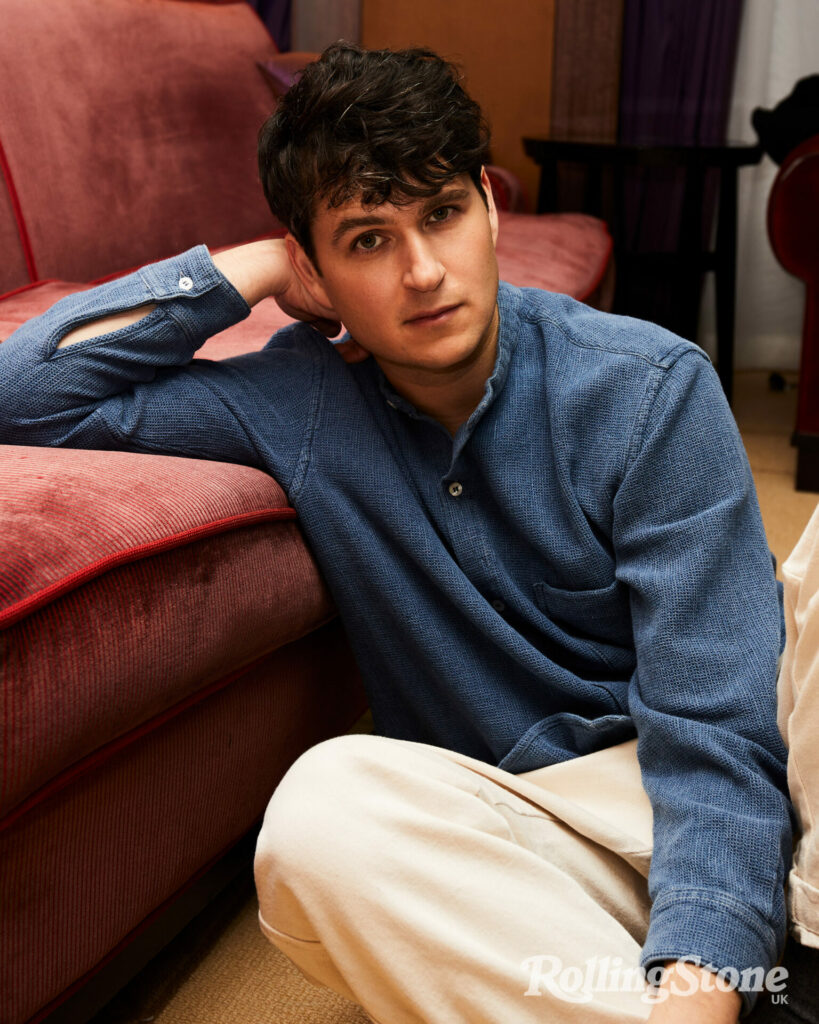
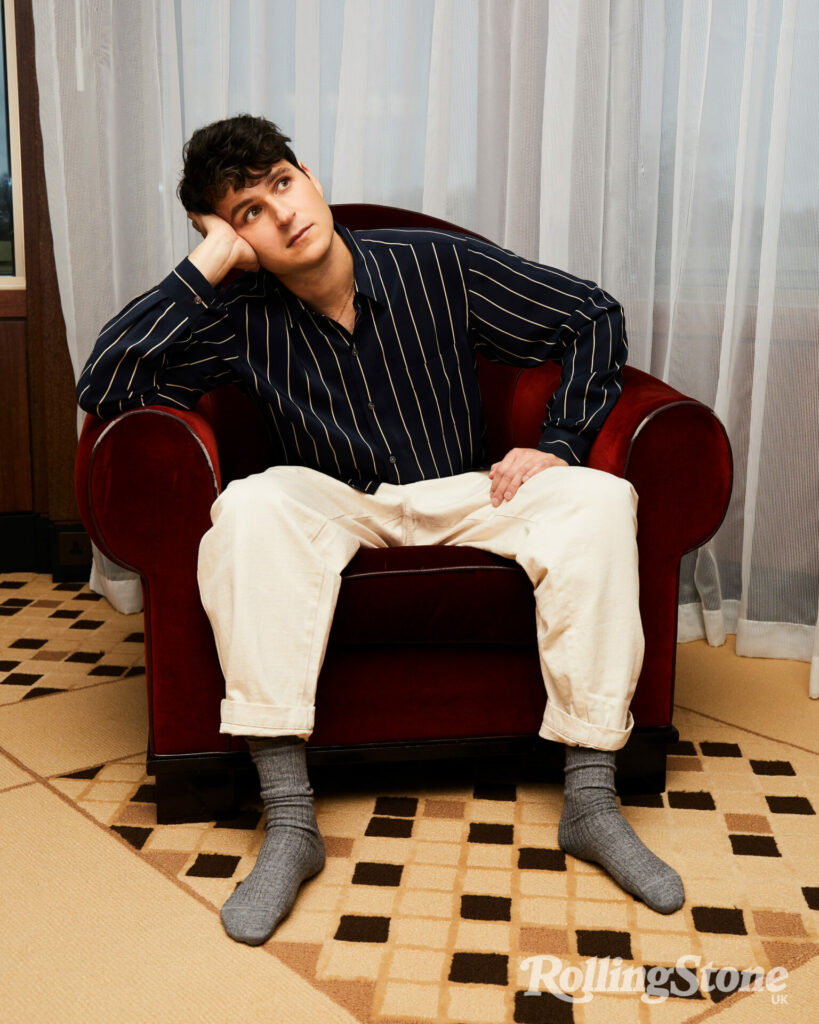
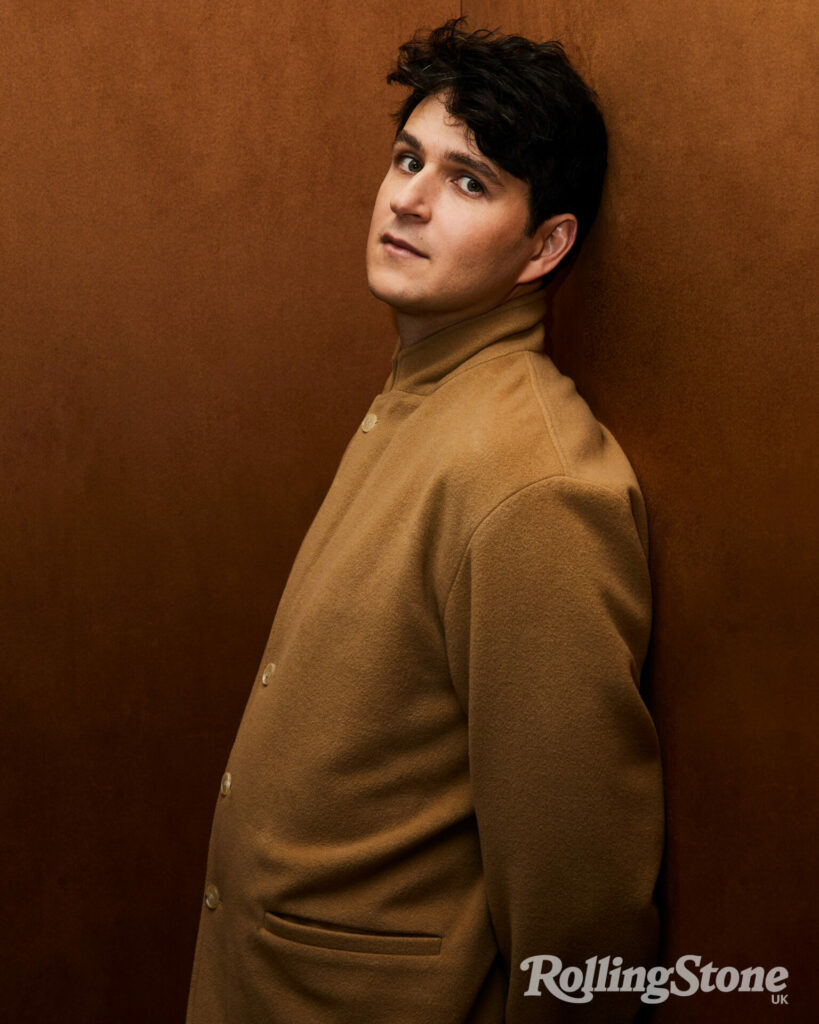
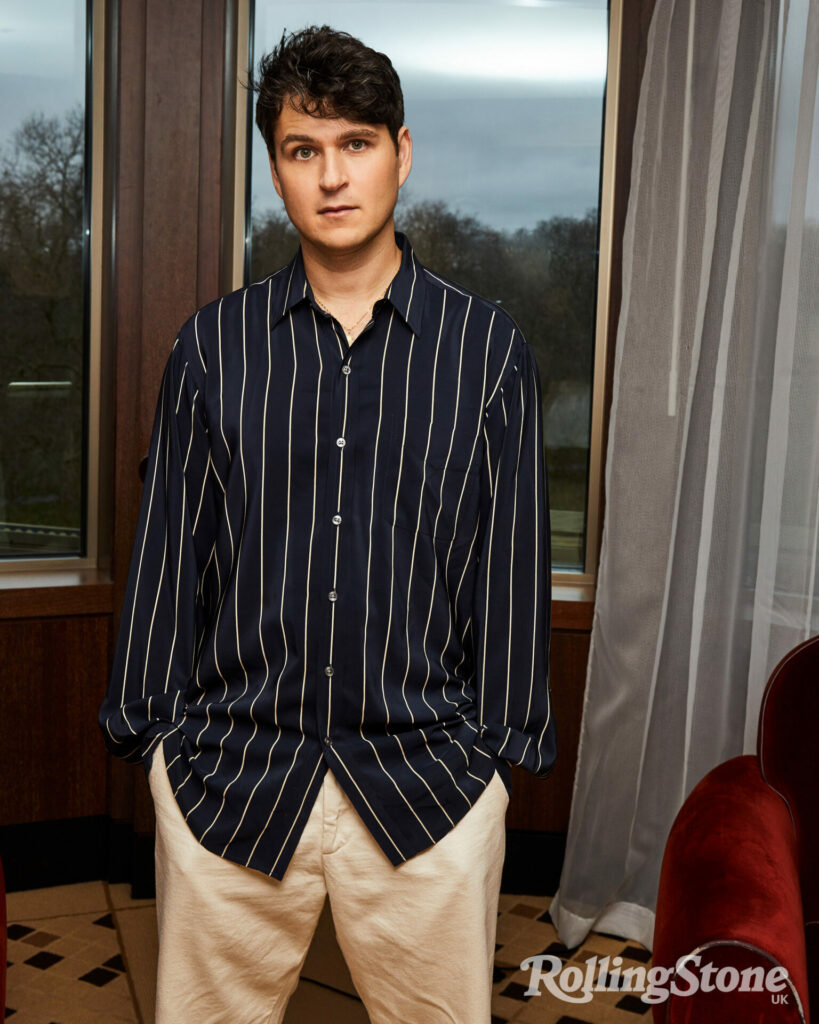
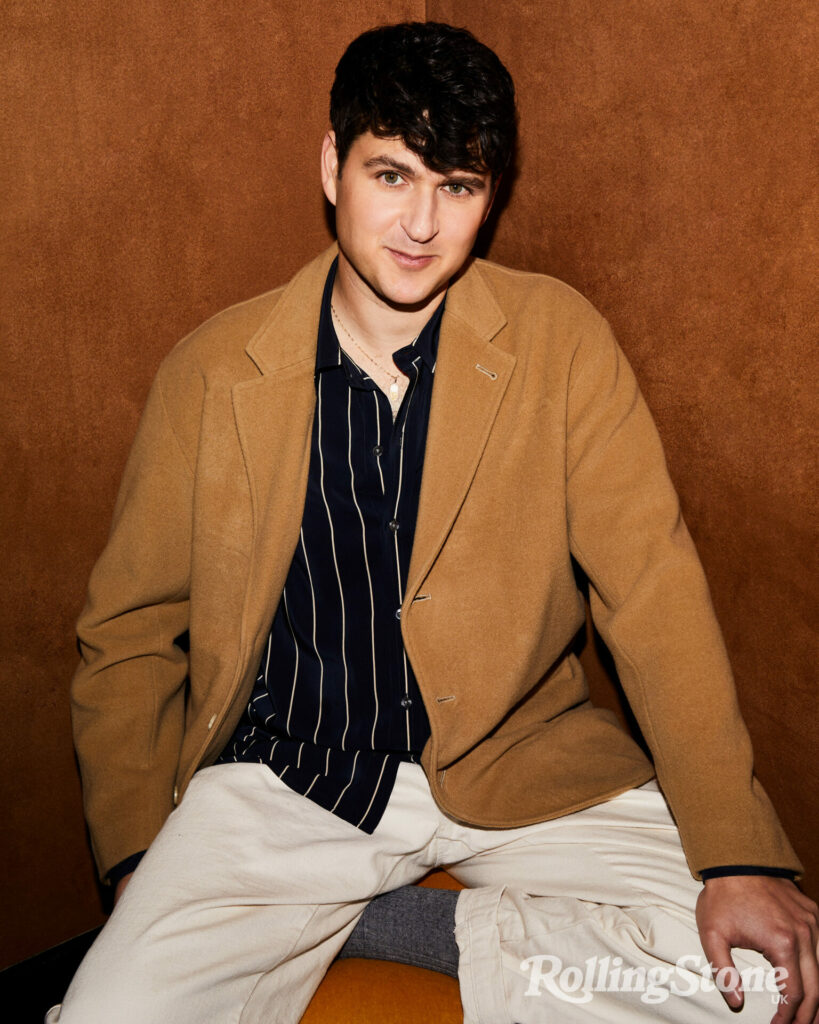
You might not think it from listening to one of the sunniest, most buoyant bands of the 21st century, but cynicism has followed Koenig around since he was a teenager. Vampire Weekend emerged from the post-Strokes indie rock scene of New York City in the late 2000s. Defined by their preppy dress sense and Columbia education, their debut self-titled album from 2008 was full of sprightly rhythms and Koenig’s polite, distinctive voice. It spawned generational hits ‘A-Punk’ and ‘Oxford Comma’ and set the band — Koenig, now-departed multi-instrumentalist and producer Rostam Batmanglij, bassist Chris Baio and drummer Chris Tomson — on the path to becoming stars of 21st-century indie.
It also sounded like the music of blissfully happy twenty-somethings living their dream, but Koenig tells me there was gloom behind the painted-on smile. “I had a world view from the ages of about 12 to 35: there are good things in the world, but more often than not, there are more bad things, and it’s disappointing. I didn’t have belief that there was anything beyond that. Looking back, it was a smug, self-satisfied feeling of thinking, ‘Yeah, I understand reality.’ That doesn’t mean I was always in a bad mood, but just had a sense of, ‘The world sucks, you can’t trust people!’
“You get thrown a few bones by the universe, and that’s great — enjoy them while you can, but don’t get used to it. That’s how I could reconcile the fact that we made happy, fun music at times. Back then, if someone told me that life is inherently meaningful, I’d probably have been a smartarse and said: ‘Well, can you prove that?’ Later in life, I’ve realised that it’s a choice you make. Your life is inherently meaningful, if you allow it to be.”

In the five years after their debut, Vampire Weekend released two more albums — 2010’s Contra and the critically revered third album Modern Vampires of the City — and solidified their place as mainstays of the alternative scene. They were a band with unstoppable momentum, but Koenig says it was all wrapped up in anxiety and worry — if you take your foot off the gas, you’ll never get back to this point. It was the six-year gap between Modern Vampires and 2019’s Father of the Bride — a gap their success afforded them — that began to shift the pace and meaning of Koenig’s life, as well as welcoming his first child with actor Rashida Jones.
“I was starting to drop the anxiety of my youth which told me you can never wait too long,” he reflects. “It was great to spend a lot of time reflecting, because deep down, my passion in life is chilling. It always has been. I even remember in the early days I was talking to another guy in a band who’s very intense, making music all the time. We were talking about the future, and at the time I lived in New York, and I can remember saying, ‘I think my vibe is just walking on the Upper East Side getting coffee. That’s what I want to do.’
“You lose that as you get hyper-fixated on your career, but then as I got older, it returned to me. I was like, ‘Right, that’s why I work so hard. So that I can have years of idleness and walking around chilling.’ I can also create a narrative where I say that all that time allows me to become a better artist and more focused, and I think that’s probably true, but above all, it’s just what I like to do.”
In the five years between Father of the Bride and Only God Was Above Us, Koenig got plenty of chilling in. During that time, he and his family — until then based in Los Angeles —spent extended periods of time in London, Tokyo and back in New York. Longtime producer and collaborator Ariel Rechtshaid (HAIM, Madonna, Charli XCX) would sometimes come and meet him wherever he happened to be stationed, but the creation of the album largely went at Koenig’s own glacial pace. “My wife would be working 14 hours a day, and my son was in school, so I was just out there pounding the pavements of Tokyo, lost in my thoughts,” he smiles.
Father of the Bride, released in May 2019, acted as a turning point for Vampire Weekend in multiple ways. It was the band’s first album without Batmanglij as a permanent member, and he went on to produce for the likes of Charli XCX, Clairo and HAIM. He still contributed to parts of the band’s fourth album but appears on none of Only God Was Above Us. It also arrived soon after the birth of Koenig’s son, though he admits that listeners’ assumption in associating the album title — written before he became a dad — with its perceived subject matter is overplayed. “To me, fatherhood is something that creeps up on you,” he reflects. “I talk to people who say, ‘The first moment I held my child, everything changed.’ I’ve never had moments like that. It was definitely an important moment, but it’s the years after and the overall change of having a family that really changes you.”
To promote Father of the Bride, Koenig appeared in press photos and interviews alone, blurring the line between Vampire Weekend as a solo project and a band, to the point where many didn’t know whether Baio and Tomson would be a part of the band when the tour behind the album began. “There was a lot of figuring out to do, and we talked about it very openly as a band,” he explains now. “I felt like we were heading into a headwind. Our indie era was over, our line-up has changed, we’re old now. Fourth albums are often slightly difficult. No one talks about a quadrilogy; it’s a trilogy!” he exclaims. “I remember thinking that it was going to be a struggle, and we didn’t want to look like damaged goods [in the press]. ‘All right, what have these guys been up to? Looks a little different!’ Me, Chris and Chris will always be a brotherhood and a unit, but it didn’t seem like the most useful public-facing unit at that moment.”

At the same time as this recalibration, the band were building a new seven-piece live band that would completely transform them. Joined by enigmatic guitarist Brian Robert Jones (Paramore, MUNA), keys player and vocalist Greta Morgan and others, they became an absolute powerhouse on tour with the loose, unrestricted quality of a jam band. “We wanted to present this big, happy family — which it was!” Koenig smiles. “It was a good way of sidestepping a difficult and transitional moment.”
On the tour, old songs were given new life, covers were liberally sprinkled into the set (notably an irresistibly funky version of the Koenig-featuring SBTRKT track ‘New Dorp. New York’), and it looked like each of the seven members was having the time of their life. During the tour, they played an 11am rarities set on Glastonbury’s Park Stage and another morning show at London’s Islington Assembly Hall, with coffee and pastries for attendees. At the latter show, they meme-ified their biggest hit, ‘A-Punk’, by playing it three times in a row.
This new angle to the band also sits well with Koenig’s personality. Often wearing the derided get-up of socks and sandals on stage, shitposting online and hosting Time Crisis, a laugh-heavy Beats 1 radio show with Jake Longstreth, his sense of humour comes most alive when away from Vampire Weekend’s music. During our conversation, he is considered and careful with some answers, leaving long pauses before responding in an erudite manner. To others, he responds instantly with a razor-sharp putdown either at his or others’ expense.
“I had a feeling that once we hit the road and did our thing, it’d add another layer to the band,” he says of the evolution of Vampire Weekend across their latest tour. “I felt happily validated when we did it. By the time we were selling out the [Madison Square] Garden, we actually were closer than ever. Once we got to this album, [presenting as] the three of us just felt so right. The truth is, I love those guys, and they’ve given me such an amazing vote of confidence over the years by allowing me to do what I want in the studio.” While Vampire Weekend largely remains a Koenig-controlled studio project, he reveals that he, Baio and Tomson are also working on a side project together which he describes as “just the three of us — a bit more democratic”.

The changes made in the Father of the Bride era affected every facet of the creation of Only God Was Above Us. While Koenig was chilling around the world with his family, he would pop into studios in New York and London and implement somewhat of an open-door policy for collaborators. At Andrew Watt’s studio in New York, he was joined by Dev Hynes of Blood Orange, who rocked up with a broken arm after a footballing accident. “At first he tried playing something on bass, but it was too awkward to play with his cast,” Koenig laughs, with Hynes then offering the even more outlandish proposition of getting behind the drum kit. The unorthodox tubthumping that followed now appears on the bright and melodic ‘Prep-School Gangsters’, and Koenig credits the contribution as “the key to unlocking the song”.
In his time away from the studio, he walked around cities worldwide listening to mixes and texting Rechtshaid “getting excited about LP6,” and introduced Jones and Hynes to his new jam band obsession by bringing them along to a Phish gig at Madison Square Garden. “I threw them in the deep end, and everybody had a ball!” he laughs, crediting his time not working as having equal importance to the finished album as the logged studio hours.
Sonically, this freedom can be felt all over Only God Was Above Us. The album traverses every era of Vampire Weekend — the major key joy of their earliest work, the dark and muddy tones of Modern Vampires and the baggier excess of Father of the Bride — and becomes their definitive statement to date. Even when singing about his cynical mind on ‘Classical’, the joyous music lifts him out of the rut, as if his new enlightened self is talking to the younger, downtrodden Koenig. ‘Gen-X Cops’ is a punk-infused track full of bluster, while the slowies (‘The Surfer’, ‘Pravda’) still bring lightness.
“We’ve always been called an indie band, and often an alternative band, but I just think we don’t have that much connection to what people think of as being classically alternative,” he says of the album’s sonic identity. “It was starting to seem more interesting to me to discover whether we can still sound like Vampire Weekend with some, like, bigger, harder, more distorted moments. More ‘alternative’ moments, for lack of a better term.” Though punk has always been in the mix on some of their biggest hits (‘Cousins’, ‘Diane Young’), it feels more raw and unhinged here, most notably on the runaway train that is ‘Gen-X Cops’ and its wiry guitar line.

Though Koenig is still unpacking what the album means to him — “I always wish you could do the press for an album five years after it comes out!” — he is keen on presenting it as an interconnected addition to the Vampire Weekend collection. “I look at the first album as the first chapter of the same story, and I’m very grateful that each album provides context. The older you get and the longer you stick around as a band, the more you’ll get different parts of your fan base who are discovering different albums for the first time. You’ll still get people who stick [2008 film] Step Brothers on and hear ‘A-Punk’ for the first time and think, ‘Who’s this?!’ That’ll probably always be our biggest song, but people are still discovering it.
“No matter what, as you grow older, things change,” he reflects. “That’s what’s most important. You roll with the punches, and you deal with change. You experience a different dimension of life, whether that’s fatherhood or whether you never have kids. There’s just something about being on this ride together.”
The title of the new album started as a coincidence. Koenig had discovered a host of images taken in the 80s by photographer Steven Siegel, one of which particularly took his eye. In it, a man reads a newspaper on a graffiti-strewn New York subway. The front-page headline reads: “ONLY GOD WAS ABOVE US.”
“I knew that it should be the album cover, and there is so much empty space on it for text,” Koenig says. After trying and failing to find a suitable space to put the band’s name and a potential album title, he settled on leaving Vampire Weekend off the cover and lifting the one single piece of text in the image for its title. “At first, it wasn’t that deep. I said, ‘Let’s just call it that.’” As time went on, the singer began to increasingly view it as a “special” name and “the perfect title for the songs”. Quite a while later, he finally thought to himself: ‘That’s a weird newspaper headline. I wonder what it’s about.’
The headline was printed in the New York Daily News in April 1988, the day after a plane flying over Hawaii had its roof torn off in a crash. In an interview after the event, a survivor used the immortal words when recounting the traumatic accident. “It’s a pretty poetic way to describe the roof being ripped off your plane!” Koenig giggles.
On April 8, Vampire Weekend will launch Only God Was Above Us at a special outdoor show at Austin, Texas’ Moody Amphitheatre at noon, the time of a total eclipse. Koenig was told about the incoming event by a friend seven years ago, and the date stuck in his mind immediately: it will be his 40th birthday.
“We were talking to one of the promoters about the show, and the guy said, ‘Wow, so cool how it ties into the album!’ I remember thinking at the time, ‘Ties into the album? It’s just randomly my birthday? How does it tie in?’ He said, ‘Only God Was Above Us! This big cosmic event will be happening right above the crowd!’ I was like, ‘Damn, you’re right.’”

As with everything regarding Only God Was Above Us, it all just seems to fit. The album closes with ‘Hope’, an eight-minute triumph (“It’s no ‘Murder Most Foul’!” Ezra laughs of Bob Dylan’s 17-minute epic track) that presents the core of his new world view. “I hope you let it go,” he sings over and over as its refrain, reflecting on a life being bogged down by suspicion and distrust and basking in the new way he’s found to live. He’s already thinking about Vampire Weekend’s sixth (and seventh) albums, but if it were the band’s last ever song, it would sum it all up impeccably.
“Every five years of my life, I can look back and say, ‘Well, that was defined by changes in this way, or I started to feel more like this,’” he says. “Have things changed in my life? Sure. Is that always clearly reflected in the music? That’s harder to say. You get the songs you get, you know? You could sit down and want to write about where you’re at in your life, but it doesn’t always work out that way. With this album, though, I do think there’s some sort of reflection and some type of maturity.”
He describes the journey from ‘Ice Cream Piano’ to ‘Hope’ as “a journey from cynicism to optimism; from scepticism to faith,” and it’s borne out on an album that presents all sides. “I think all those things are true, and I do feel like that’s a journey I’ve been on. I can think of many times in my life where I very much related to the ‘fuck the world’ mentality, if only in the sense of being continually disappointed by things beyond my control, and not recognising the extent to which there was another way to live,” he reflects as we wrap our time together. “That’s a lifelong journey, and I don’t want to pretend I’m no longer disappointed by anything, but when I was young, I was the epitome of a cynical, rational, pessimistic materialist. Being older now, all I know is that I’m not that anymore.”
